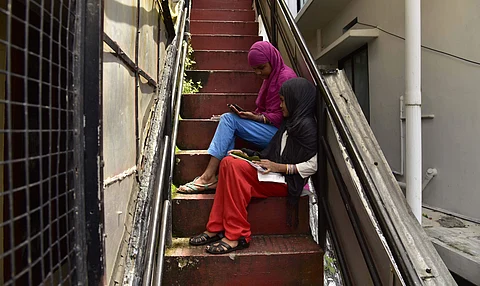

Ever since the UGC brought out their plan to implement a blended mode of learning across higher education institutions, students and teachers have raised concerns about the feasibility of the plan and pointed out that this might even degrade the quality of education India now has. While the usual problems of online divide and access to remote areas remained concerns, teachers at the University of Delhi and Jadavpur University among others have raised concerns about whether this is a ploy for investing less from the governments part and pointed out that this would reduce job opportunities for teachers in India.
The Delhi University Teachers' Association (DUTA) released a 13-page long document explaining why they think the blended model won't work. Not only is the internet a problem and the plan would cause a digital divide, the DUTA said that this would also mean that fewer teachers will be employed. "Put together, the policies may reduce the workload by 75 to 80 per cent. This seems to be one of the major reasons as it will reduce public spending," the teachers. "Across the country, over 30,000 teaching posts in higher education are lying vacant even as lakhs of aspirant have been waiting for permanent appointments. Contracting and ad-hocism have increased the hardship of teachers. In the University of Delhi, over 4,500 teachers (the number has steadily increased over the past decade) are teaching against vacant positions for the past several years. Late entry into the job coupled with an increase in job insecurity, poor service conditions and lack of job satisfaction will cost the teaching profession dearly. In turn, this will impact the number of students opting for higher education," said the teachers.
Agreeing with the DUTA point of view, the Jadavpur University Teachers' Association (JUTA) said that the government has an agenda to reduce government spending on education. The UGC note puts a lot of emphasis on expansion and access to innovative education but the JUTA said that the "hidden agenda" is to advocate reduction of government spending on higher education in the name of “quality education”. "Higher education expenditure with respect to the GDP of India, as reflected in the Union Budget during the last eight years, has declined sharply. During the ongoing pandemic situation, millions of guardians have either lost jobs or had their earnings slashed. The NEP has been framed to take the opportunity of the pandemic to introduce capital-intensive online education, at a time when face-to-face interaction between teacher and student is next to impossible," they added.
Although the digital shift is inevitable as institutions cannot be opened at this point, the JUTA said that the government does not have the right infrastructure to support this shift and that they should concentrate on that first. "There is no denying that the application of digital tools to make the teaching-learning process more innovative and inclusive is the need of the hour, but for this, the necessary physical infrastructure must be developed by the government," said the JUTA.
The Jawaharlal Nehru University Students' Union (JNUSU) too has called the UGC plan an "attempt to make higher education exclusive for the socio-economically advantaged". The JNUSU also said that there is no "evidence to vouch for the effectiveness of online classes". "Continuing in this mode affects the quality of academia as it cannot substitute the learning that takes place in classrooms. Moreover, any advantage that might arise from the blended mode comes at a greater cost of exclusion of students from marginalised communities from getting higher education. No matter how planned and prepared the draft is, it renders the socio-economically marginalised students unaddressed and further disadvantaged," said the union. "The claim that these issues can be solved readily with a budgetary allocation of 3-3.5 per cent is nothing but an assumption of the government that is devoid of any considerations to social and material reality," the statement further added.
Even though students were forced to opt for an online mode of examination, their experiences were stressful and in some cases horrific when their papers were not uploading or the wrong question paper got downloaded. But the UGC has not take these into consideration, said the SFI. "The so-called "Student Centric" Model is a garb under which the UGC is trying to replace proper structured and academic well-developed. modules with online modules neglecting students' experiences over the past year," said the student body.
Many other student units have said that this is a problematic plan to even propose at this point. But the UGC has not yet explained its stand or finalised their draft plan.
